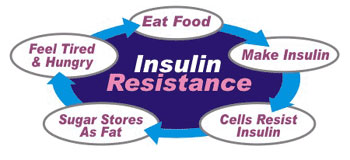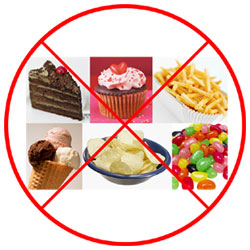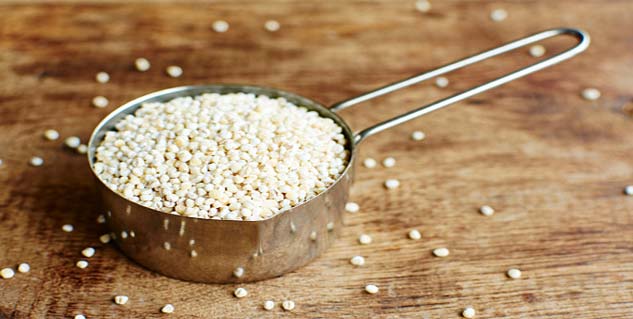Balance 4 Hormones for Fat Management and Weight Loss
You may have seen a lot of hype recently on TV shows like Dr. Oz or in New York Times best seller lists about being hormonally imbalanced. But what does this mean? Can it actually have an impact on weight gain or weight loss? The answer is simply yes. Your hormones control every process that occurs in your body, which includes maintaining weight, gaining weight, or losing weight. This information is paramount for taking a proactive stance on your health and fitness. Being hormonally imbalanced can be holding you back from attaining these goals.
The four horsemen of fat management are insulin, cortisol, testosterone, and growth hormone. Of these 4 key hormones, insulin is the ringleader. If you can manage your insulin levels, it helps to bring the others into balance. In general, when insulin levels are high, testosterone and growth hormone will be low. Chronic elevation of insulin results in chronically low testosterone and growth hormone. This results in fat deposition in certain areas of the body, reduced muscle mass, lowered immunity, reduced tissue regeneration, and many symptoms as listed below. In addition to these four, excess estrogen can bring you into hormone imbalance as well. This is a common problem as many environmental toxins we come into contact with are exogenous estrogens.
To start, below is a list of basic yes or no questions. If most days you have the experience or feeling, circle Yes. If not, circle No.
- I crave sweets during the day.(Yes/No)
- I am irritable if I miss a meal.(Yes/No)
- I need coffee to get myself going in the morning.(Yes/No)
- I get lightheaded if I miss a meal.(Yes/No)
- Eating relieves fatigue.(Yes/No)
- I feel shaky or jittery during the day.(Yes/No)
- I am agitated easily or nervous.(Yes/No)
- I forget things I should remember.(Yes/No)
- My vision gets blurry.(Yes/No)
- I feel tired after meals.(Yes/No)
- Eating sweets does not relieve sugar cravings.(Yes/No)
- I always want some desert after a meal.(Yes/No)
- My waist girth is equal/larger than my hip girth.(Yes/No)
- I have difficulty losing weight.(Yes/No)
If you answered Yes to more than half of these questions, then it is very likely that you have a hormonal imbalance due to poor blood sugar regulation. Correcting insulin resistance is the first and key step to addressing all other hormonal imbalances, such as excess cortisol and estrogen, and decreased growth hormone and testosterone.
The following lists showcase symptoms that are common with each individual hormonal imbalance. Typically a trend will be seen in one area or another. I am illustrating these symptoms so that you may see how broad and varied the effects of hormonal imbalance are.
Excess Insulin:
 Age spots and wrinkling
Age spots and wrinkling- Sagging skin
- Cellulite
- Skin tags
- Abnormal hair growth on face or chin (women)
- Vision changes or cataracts
- Infertility or irregular menses
- Shrinking or sagging breasts
- Erectile dysfunction
- Heart disease
- High cholesterol, high triglycerides, or high blood pressure
- Burning feet at night
- Water retention in the face (puffiness)
- Gout
- Poor memory, concentration
- Fat gain around love handles and abdomen
- Fat over triceps
- Overweight, weight gain, obesity
- Hypoglycemia
- Fatigue after eating (high carbohydrates)
- Type 2 diabetes
- Sleep disruption or deprivation
Excess Cortisol:
- Wrinkling, thinning skin, or skin that has lost its fullness
- Hair loss
- Infertility or absent menses (not related to menopause)
- Feeling wired at night
- Heart palpitations
- Loss of muscle tone in arms and legs
- Cold hands or feet
- Water retention in face (puffiness)
- Poor memory, concentration
- Loss of libido
- Depression, anxiety, irritability, or seasonal affective disorder
- High alcohol consumption
- Frequent cold and flus
- Hives, bronchitis, allergies, asthma, autoimmune disease
- Fat gain around love handles and abdomen
- A “buffalo hump” (fat on back of neck and upper back)
- Difficulty building or maintaining muscle
- Loss of bone density or osteoporosis
- Hypoglycemia
- Difficulty falling asleep
- Difficulty staying asleep (waking between 2am-4am)
- Irritable bowel or frequent gas and bloating

Excess Estrogen:
- Spider or varicose veins
- Cellulite
- Heavy menstrual bleeding
- PMS, with breast tenderness, water retention, bloating, swelling, weight gain
- Fibrocystic breast disease
- Breast growth, prostate disease, erectile dysfunction (men)
- Irritability, mood swings, or anxiety
- Headaches or migraines
- High alcohol consumption
- Allergies, autoimmune disease
- Fat gain around hips (women)
- Current use of hormone replacement or birth control pills
There are many similar symptoms between the different hormonal imbalances. In addition to symptoms, it is common to see fat accumulation in certain areas of the body with these imbalances. Excess insulin will not only encourage your body to store glucose and fat, but will actually block fat burning, especially around your abdomen. Insulin will also cause water retention, giving you a puffy look. Excess insulin secretion can result from consuming too many nutrient-poor, processed carbohydrates, insufficient protein and fat intake, insufficient fiber intake, chronic stress, under-exercising, and over-exercising. As I mentioned before, insulin is the ringleader to hormonal imbalance.
 Excess cortisol is extremely destructive to your muscle tissue. As your body tries to adapt to chronic stress, which contributes to this imbalance, your metabolism is slowed by depression of the thyroid. Cortisol also decreases the happy hormone, serotonin, in the brain causing you to crave high amounts of carbohydrates and fats. This is a disaster for your midsection, as it forces you to accumulate abdominal fat. Excess cortisol can also affect insulin response causing hypoglycemia or low blood sugar.
Excess cortisol is extremely destructive to your muscle tissue. As your body tries to adapt to chronic stress, which contributes to this imbalance, your metabolism is slowed by depression of the thyroid. Cortisol also decreases the happy hormone, serotonin, in the brain causing you to crave high amounts of carbohydrates and fats. This is a disaster for your midsection, as it forces you to accumulate abdominal fat. Excess cortisol can also affect insulin response causing hypoglycemia or low blood sugar.
Excess estrogen, also called estrogen dominance, will present differently between women who are menopausal and those who are not. Fat will accumulate around the midsection in women who are menopausal, and around hips and thighs in women who are not. Either way, estrogen dominance will cause toxic fat gain and water retention. Environmental estrogens consumed from pesticides, herbicides and growth hormones used in foods, plastic food ware, birth control pills and even chemical laden make-up precipitate this.
As I mentioned above, when insulin is chronically elevated, testosterone and growth hormone will also be chronically lowered. Therefore, when it comes to your diet the main thing to address is regulating your insulin levels. This includes lowering the amount of sugar and processed carbohydrates one consumes and understanding how to reduce and manage stress in your life.
How many of the above symptoms are you experiencing? You could have a hormone imbalance and this could be preventing you from attaining your health and fitness goals. If so, it is advisable to see your health care practitioner for further testing (as hormone levels can be tested) and receive assistance on how to optimally balance them.
-
How Diet Soda Hurts You
Exactly why is diet soda so bad for you and your health?
-
Sprinting for Weight Loss
Sprinting can be an important part of your weight loss routine. Inter
-
Which fruits and vegetables are best for weight loss?
Research were watching Eating more fruits and vegetables can
-
How To Have A Healthy Weight Loss
According to a survey conducted in the last couple of years, the probl
-
8 Things I Learned From Being A Contestant On The Biggest Loser
I was 21 years old when I was a contestant on NBC’s The Bigge
-
10 Commandments Of Fat Loss
We all know that the 10 Commandments are
- DON'T MISS
- Four Simple Principals For Controlling Weight Through Diet
- The four types of mini sites you can create and make money from.
- Tips About How You Can Lose Belly Fat
- Are You a Carb Addict - Yes or No?
- Rating The Fad Diets
- The Master Cleanse Diet - One Of The Best Ways To Lose Weight And Get Healthy Fast!
- How To Lose Weight Fast - Is It Really Possible? Using The Right Diet Plan
- Natural Weight Loss Remedies
- Three Non-Food Weight Loss Tips to Motivate the Dieter
- Benefits of Fish Oil Supplements




